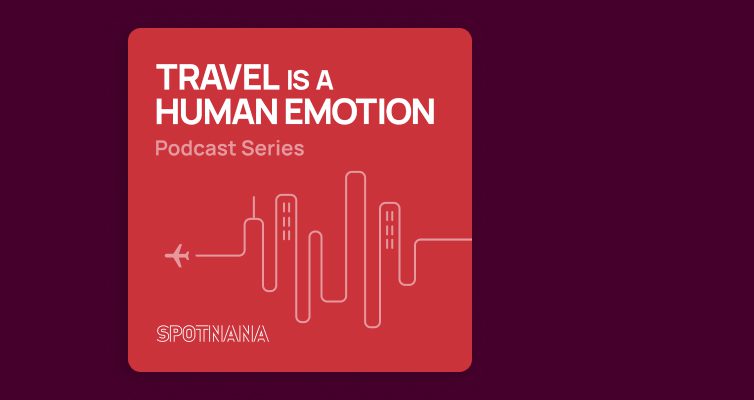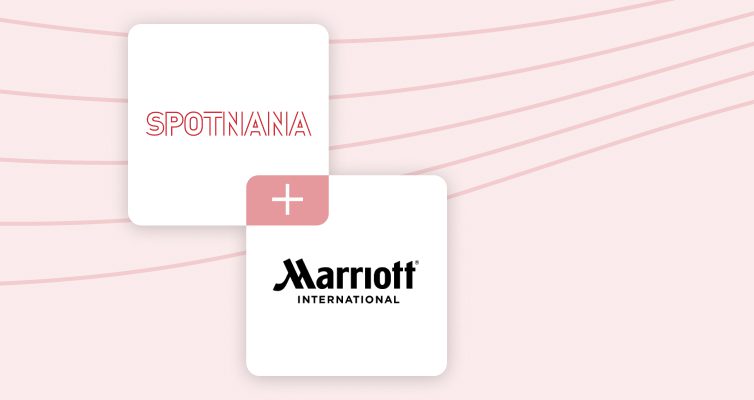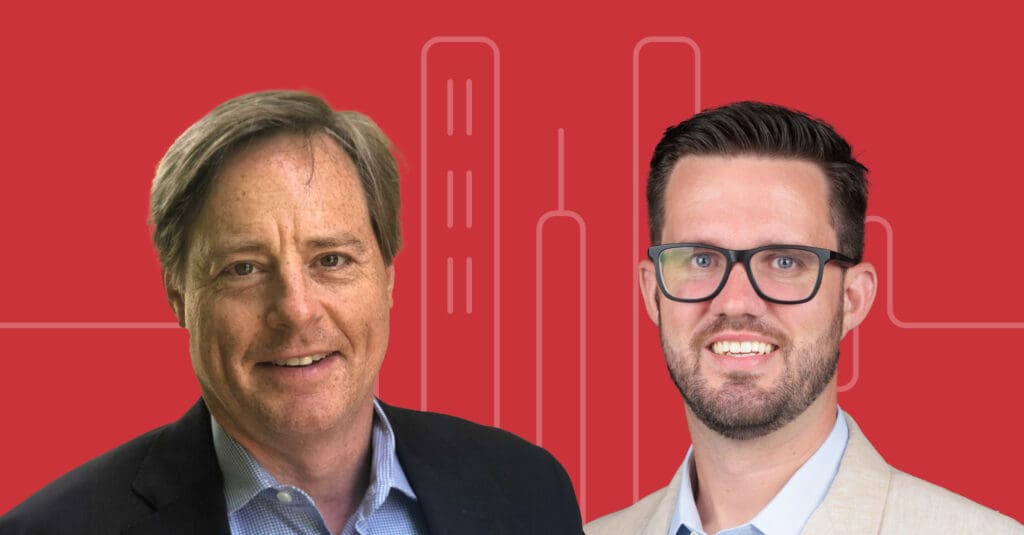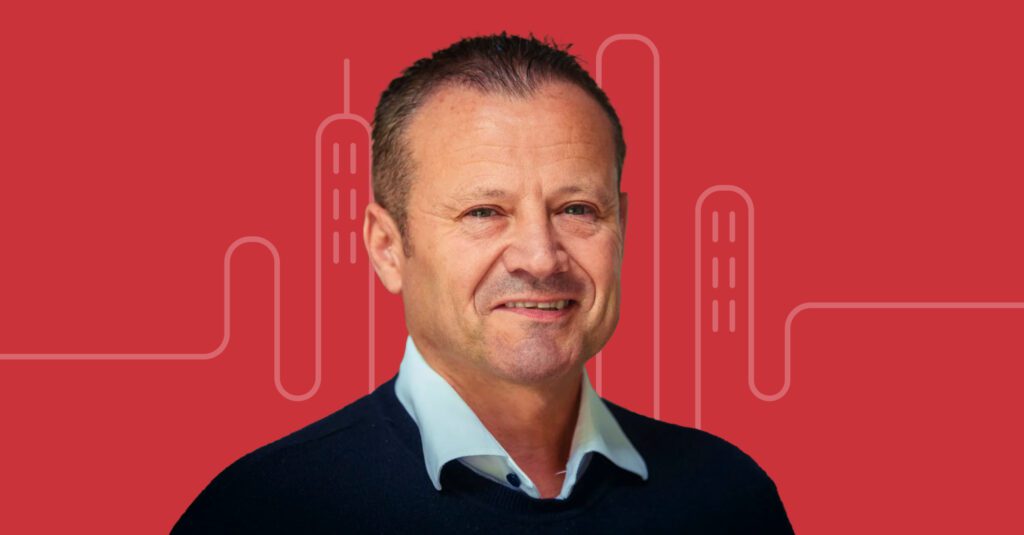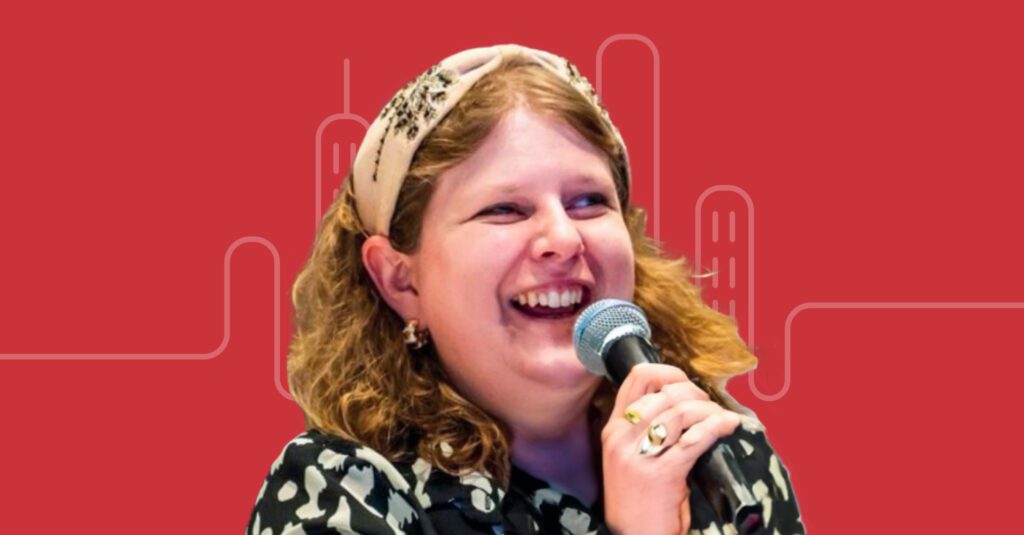Scaling a TMC built on modern infrastructure with Solutions Travel CEO Mark Walton
Guest: Mark Walton, CEO, Solutions Travel
Host: Sarosh Waghmar, Founder and Chief Product Officer, Spotnana
Length: 31:11
Solutions Travel CEO Mark Walton joins Spotnana’s Founder and Chief Product Officer Sarosh Waghmar and VP of Marketing Justin Schuster to discuss the power of building a new travel management company on Spotnana’s open Travel-as-a-Service platform.
Mark Walton: The goal is for continuous improvement. And I think the technology base allows that continuous improvement to happen. That’s the kind of evolution, that’s the kind of reinvention that I believe TMC is deep.
Justin Schuster: Welcome to the Travel Is a Human Emotion podcast. My guests today are Mark Walton, the CEO of Solutions Travel, and Sarosh Waghmar, Spotnana’s Founder and Chief Product Officer. Solutions Travel is a new and rapidly growing TMC that came out of stealth and announced a partnership with Spotnana in early 2023.
Mark, let me ask my first question to you. You’ve been in the global corporate travel space for 30 years. You were a consultant for many years, and you’ve also held executive positions at Orbitz and Options Travel. What were some of the biggest learnings you had about the travel industry in your time as a consultant and as in your time as an operational leader.
Mark Walton: Thank you, Justin. And first of all, thank you for having me and pleasure and a privilege to be here with you all. And yeah, I’ve had, as you said, a number of years in this industry and a lot of experiences on the corporate travel stage. And in fact, on the global stage and from a learnings perspective, when I started the consulting business many years ago, we were amazingly fortunate to have landed Microsoft as our first client.
And it was interesting. Back then, 20, 20-ish years ago, you think about where the industry was and where it is today. Back then iPhones hadn’t even been launched yet, iPhones didn’t come out until somewhere around 2007, 2008. So there were no mobile applications. There were no mobile boarding passes.
Global travel management was an opportunity, but not something that most companies had realized. And we spent about six years working on the Microsoft account helping them in developing a global travel program. And the learning from that was how incredibly difficult it was to affect efficiencies in this industry, because the technology at the time just didn’t allow it. So it was slow. It was dinosauric.
There were problems in creating a consolidated environment that was consistent reporting was 45 to 60 days after the fact it was very difficult to affect efficiencies. And I learned that the industry needed to do something, to adapt, to allow, to change, to happen and efficiencies to be created.
It was just an incredible experience because I was part of the transition, having stayed there for about six years. And then ultimately having this consulting business for 12 years, where we brought other companies into the global travel management consolidated space. And, uh, took advantage of what were opportunities that technology created after many years of inefficiency. So that was probably the biggest learning.
Justin Schuster: And so it sounds like you’ve always been looking at ways for technology to drive better efficiency and travel and to deliver better experiences to travelers. What was the thought process that led to founding Solutions Travel, this new TMC that you’ve created?
Mark Walton: So for many years having been in various elements of the space and knowing about the marketplace needed, I remember being in a conference, it was another online booking tool company at the time. I remember one of the executives of the company standing up and talking about their concept of the perfect trip and the idea of a perfect trip and it could be different for different companies, but in essence, it was integrating all the components of travel into a single platform, a single ecosystem. And I’m a marketing guy from education and it really resonated with me, the perfect trip. And it sounded great. As you obviously identify exactly as to what that might mean. But 12 years later nobody had developed the perfect trip. Not that company, not anybody.
And, I knew I was an executive at another travel management company. A traditional travel management company that was using traditional tools, GDS-centric. And I knew that we weren’t going to get there without technology that allowed freedom from the constraints that legacy systems had.
And, one day I called a friend of mine, Johnny Thorson, who was Vice President of Strategy at Spotnana. And I heard about this. And didn’t really know anything about it. And I said, Johnny what are you doing? What is this Spotnana thing all about? He told me and the key thing that resonated with me in that conversation was the idea that Spotnana was essentially turning the industry upside down and rebuilding the infrastructure from a technology standpoint.
Allowing an open-API type of an architecture to allow the individual components to be integrated to whatever a client essentially wants. And it resonated immediately with me to this concept of a perfect trip. And I thought to myself, if any company in this industry has the ability to create and fulfill this objective of a perfect trip, I thought Spotnana had that opportunity.
I thought, how do we get involved? And that’s what really started us on this path.
Justin Schuster: And how did you get involved? How did you and Sarosh first meet? And how did the partnership between Solutions Travel and Spotnana come together? And Sarosh, I’m interested in hearing that from both sides.
Mark, why don’t you start?
Mark Walton: Yes, Sarosh will remember this. It was an interesting conversation that started around a small little company called Walmart and I happened to have a very close relationship with Walmart through another business that I was involved in.
When I heard about Spotnana and I knew Walmart and I knew what kind of company they were, what they were looking for in travel management, I thought of Spotnana and I thought, let me introduce them. And so I called the head of travel at Walmart. I said, would you be interested? She said, yes.
Spoke with Sarosh. Would you be interested? Of course. As we all know now, Walmart became a Spotnana client, and then there were other companies that we started to present to Spotnana as opportunities. And Sarosh said one day, Hey Mark, stop, stop. I appreciate all this, but this was a long time ago, a year and a half or so, almost two years ago.
We don’t have the bandwidth to handle all this business that you’re throwing our way. And this, he said why don’t you do this? Why don’t you handle them, use our platform and handle them? And I said, frankly, we don’t have the bandwidth either at the company that I was at.
But then I thought about it and I said, why don’t we create a company exclusive to selling, fulfilling, distributing, Spotnana technology. And Sarosh loved the idea. And that’s what we did. Do I have that right? Sarosh?
Sarosh Waghmar: Yes very much. I think the piece I’d love to talk about the travel industry, we’ve always said travel is a human emotion. Mark knew Johnny, he had a relationship with Johnny and he decided to take a bet on us. We’re so fortunate that our paths crossed. But the one thing that I do remember about meeting Mark for the first time was not only his knowledge, but every time Mark introduced us to someone the way they respected him or the way they perceived him just with was with utmost and of the highest regards that it became so much easier for us to talk about Spotnana because it seemed like Mark had already endorsed it even before it was sold.
So I think that was the secret sauce of this relationship. As we continue to progress forward, I think Solutions was our first TMC official partner. But I think the relationship with Mark had started off much before that. Now that we are integrating and we’ve launched some additional customers with Solutions the best part about this relationship is getting feedback, those feedback loops of building the platform, having truly a partner that has the same objectives and goals that you do.
I think that is something that is often overlooked, if you want to make change, you can’t make this change alone. Never. It’s always going to be with people who carry you and who you carry along for the ride. And I think that’s the single biggest thing about this partnership that it has evolved from just being, typical customer relationship to someone who’s truly a partner, who gives us actual feedback.
Okay, this is what customers want. We go and pitch together as well. And that’s what makes this partnership with Spotnana and Solutions so unique is the fact that we have the same objective. And we’re trying to make sure that we do right by the customer in doing right by the customer. We want to make sure that Solutions continues to scale with technology and not through human capital.
I think that’s the biggest thing as we continue to roll out more customers is how do we create more efficiency for a TMC and not just from a feature perspective? How do we actually reduce the cost of operating? And I think this is what we are working towards, is how do we show you those inflection points?
And, with Mark and his team, that has been the biggest learning curve for us, is to get those details and to get things behind the scenes that have nothing to do with the customer. It’s all about the TMC operation. Having a partner to give you that feedback is what is so valuable as Spotnana continues to innovate on its platform.
And Mark would be the first to tell you, there’s a lot of work to be done. We are far from done and we are grateful for this partnership.
Mark Walton: No, I just wanted to say that, yeah, it’s, it is an evolving partnership as all good technology companies should be. It should be evolutionary. And that’s what we talk about with clients as well, technology.
It should change. It’s enhanced. We do work with Spotnana pretty much every day on innovation that we get through not only us, but through our feedback from our customers. And so we talk about with our customers, when we start the relationship you’re buying us not only for today, but what we’re going to be tomorrow and the years after that, the years after that.
But I echo what Sarosh was saying in the realm of connections, even though technology is enabling people to move past this direct interaction with an agent in many cases, the overarching relationship as a travel management company has to remain, very intricate, integrated into a company.
Our goal is to develop really strong. Partnerships not only with Spotnana, of course, but with all the ancillary types of companies that are associated with the product, meaning integrated into the product, things that we can add in terms of value to the customer, but really connect with the customer and be their partner in travel management.
That’s the message that we talk to customers about. If we gave a 10 second elevator pitch, it would be combining arguably the best technology in this business with proactive account management and concierge level services. A lot of that involves a human connection, the point of this podcast.
So there’s a lot of that still required in this industry. In order to create the kind of successes with companies that we already have. And we’d like to obviously continue to have in the future.
Justin Schuster: Talk more about the human connections between Solutions Travel and Spotnana. How what’s a day in the life of the partnership look like for you, Mark?
Mark Walton: Yeah it’s interesting because I just talked to somebody about this just a few days ago. We probably have at least 10 or so different communications every day with somebody at Spotnana. Part of it is just ongoing meetings that we talk about innovation, ideation part of it is problem solving.
Not everything is perfect yet, so we’re feeding back information from a client to Spotnana. And those conversations happen and are ongoing, but I came from a software environment. I was, I worked for Orbitz for many years and, software isn’t perfect. There are bugs but it’s important for us to be responsive to the customer.
And that’s the way in which we work very closely with Spotnana. So we have a process that we go by to provide ideas, and also things that may need fixing. We get immediate responses. It tells us how long it might take and then we move on. But the communication is great. We also communicate with new business opportunities.
I think Sarosh just touched on it but we work really closely with new customers, customer development large and small, we’re on joint calls with some of Sarosh’s sales team and our sales team. We make joint presentations to clients when it’s appropriate.
We do that on our own, of course, as well. But the partnership is excellent. If we call on Spotnana for assistance they’re absolutely there for us and helpful as good partners should be.
Justin Schuster: Is there anything you want to add about the partnership from your side and what a day in the life feels like for Spotnana?
Sarosh Waghmar: I think Mark has been extremely generous to us. We should call it out that Mark took a bet on us. I know people who are listening to this call should know that Mark is the one who went out of his way to give Spotnana a break. And for that, I’m forever grateful. People who take a bet on you when you have nothing are the ones that you should be always grateful for because Mark basically has taken the risk of starting an entire TMC on the backbone of Spotnana.
I’m not sure who else would ever do that. But at least at this point of time, no one has. And for that, I’m grateful. And this is truly a partnership because Mark has a lot riding here and we need to make sure that we deliver on Mark’s promise. Mark and his team have had a great reputation in the industry for so many years, which is why we’re here.
Solutions was onboarded. The buzz was about a former Orbitz executive deciding to build a brand new TMC on the backbone of Spotnana. And one of the things that resonates when we talk to some of these large Fortune companies, which Mark is pitching to, is just the relationship that he has with them. People trust him and he’s been around the industry for so long.
And I think at the end of the day, you can build any technology in the world. Yes, it has to resonate. It has to solve problems. But trust is the only currency. And that’s what Mark brings to the table more than anything else. He’s well trusted. He’s someone who they respect. And when Mark decides to endorse this, it matters.
Obviously, you have to deliver and all of that, that breakthrough that everyone needs. We are fortunate that Mark is the X factor that makes all of this happen.
Justin Schuster: And Mark, you’ve brought on some very exciting customers. Can you tell us any stories about some of the relationships that you’ve had and or that you have?
And what are some of the things that those customers are saying about working with you and working with Spotnana?
Mark Walton: Yeah, let me just follow up on just one thing that Sarosh said. Clearly I appreciate the comments. It’s clearly not all about me. One of the things that I am most proud of in building this company is the team that we’ve assembled.
We have brought on people from some of the largest travel companies in the world. We have a global team now in just over a year, we’ve assembled this operationally, sales, account management. Talented people who are driven, who believe in us, believe in Spotnana. It is the proudest element of what I’ve been able to do so far.
It’s really quite amazing and it’s enabled us to bring on, to your question, some terrific clients small and large. Some of the smaller clients that we have are enjoying some immediate successes and in the large clients that we have we’ve got, some that are up and running fully, others that we are in the stage of implementing on a global level, but it’s quite exciting.
And I will just give you a couple of examples. One of our newest clients is US only, not multinational. They just started out with us. They came from a large TMC in a very traditional environment.
The first week of operation with us, they had a 99% online booking compliment. So 99 percent adoption, which is unheard of in this industry. And, so hats off to the tool because it allows us to make that happen. And they are, I just met with a travel manager who was in my office this week, enormously happy.
And another example, which is our flagship story on a global level. We spent about eight months in an RFP process, with a very large multinational company. We run the business and we just started about roughly two months ago. And this is a company that we are implementing in 40 countries around the world.
We are now currently operational in the U.S. and Canada, all of Latin America. We launch on July 22nd, Europe, and then in August, the APAC region. So we’ll have all 40 countries implemented live. And a single platform globally in August and testament not only to the great people that we have that are enabling that but it’s the technology that allows us to be efficient in rolling out a global program like that.
Without this type of technology we wouldn’t be in the position that we’re in.
Justin Schuster: And Mark, with the customers that you’re seeing out there, what do you feel are the big pain points that travel managers are really focused on this year and do you see any difference this year relative to last year?
Mark Walton: So, yeah there’s a lot, obviously the industry is well down the road of this discussion about NDC and content. Content has been probably the biggest pain point that has existed for quite some time. It continues to be today. It’s the old story about what’s the biggest complaint that a travel manager has today.
It’s people calling me that I could find something cheaper elsewhere. That’s one of the objectives that we have and Spotnana has in bringing the kind of integrations that exist today through NDC and other direct connections, both airlines and other suppliers. So content is a difficult problem to solve.
It’s not perfect. I don’t know that it will ever be. But clearly with this ability to access the lowest fare content we have a tremendous advantage in solving a huge pain point for travel managers. The whole element of, if you’re talking about, multinational companies, the other biggest pain point, especially when I was a consultant, was in actionable data on a global level.
As I said at the very beginning, it could take 45 to 60 days to aggregate data from a large multinational company. Implementation or configuration. And that is because in the traditional world, most TMCs today still use individual back office systems in every country. So the data flows through the GDS into a back office, and then somebody’s got to consolidate that from 20 countries, 40 countries, 60 countries.
And it takes time. The problem was, it took too long to be actionable. And the second problem was inaccurate when the travel manager finally got the data. That was one of the first things I recognized when I spoke to Johnny a year and a half ago, is that the way that the architecture is set up, have the ability to deliver timely data, literally real time, from every point of sale around the world, literally everywhere.
So the travel manager has instant access to their data. And frankly, so does the individual traveler. So the traveler has their own dashboard, the ability to see what they’re doing. CO2, for example, sustainability, a huge initiative, of course, by companies today they’re able to see what their footprint is, but it’s an incredible advantage and it solves one of the biggest pain points that travel managers have had for many years.
Justin Schuster: And Sarosh, when you think about these pain points around content and around data, what are some of the things that you think about are opportunities still to be addressed and what are you excited about tackling in those areas?
Sarosh Waghmar: I think data and content. One aspect of it, but I think the biggest piece that we are excited about is there will always be multiple content sources.
It’s how you process those sources is what is the key. And I think that’s an area that we are heavily focusing on at Spotnana. And how do we become a platform, being a product company is one thing and becoming a platform is something completely else. The focus on the platform piece is, how do you take these disparate data sources, how do you process them, how do you make it efficient for a customer to make changes for it, and how does that data feed back to the TMC or the travel manager seamlessly, without any human intervention.
And I think the infrastructure piece is one of the biggest pieces that we’re excited by, and that’s where we’re investing heavily in. Our whole premise is that we do not have a mid office. How do we do that? Heavy lifting, how we do all the processing. It’s all what happens behind the scenes.
And I think that’s where the magic sauce lies. And as we continue to innovate, that is how a TMC will be able to onboard Spotnana at a global scale much faster. And I think that’s where we need to continue to invest so that we can see a lot more greater adoption and this truly become a platform because at the end of the day, the biggest premise for us is.
How do we make sure that Mark is successful and his customers are successful? Because if you do that that’s how you become a platform company when other people learn to adopt you and can make more money than you do and that’s the whole premise and I think that’s the big piece that we are tackling over the next 12 to 24 months investing on that.
Mark Walton: Sarosh’s comments are interesting to me because it makes me think back about, I’ve done a lot of speaking over my years, especially when I was a consultant, GBTA and ACTE and organizations like that. When I used to talk about how the industry can create additional value and efficiencies, and I was coming from a travel management company core, and I had a visual and I’ll describe for you, it’s easy to visualize use the concept of a wheel and spoke where the center of the wheel In this particular case was the TMC and all the spokes were all the integrations to the travel ecosystem.
So booking, expense, duty of care, sustainability and everything that you can imagine. And what my comment around that was that in order for a wheel to turn optimally, the spokes need to be aligned. In this case, the architecture creates this, what I would call perfect alignment because it is all integrated into that same platform.
And that’s allowing us to allow the wheel to turn optimally for our clients to then gain optimal value. So it’s, I echo exactly what Sarosh said.
Justin Schuster: And it seems as though there’s a lot of change happening in the travel industry more so recently, maybe than in a few years leading up to this.
[And that’s putting a lot of pressure on the industry in various points and places. When you think about TMCs in particular, what do you think are some of the challenges that TMCs are struggling with now? And what do you think is going to happen in the next four or five years or so, if you were to look out into the future?
Mark Walton: Yeah. So people have been predicting the demise of TMCs for a long time. It’s never going to happen. TMCs create so much value. We talked about it a little bit already. But there are issues that TMCs need to deal with. They need to reinvent themselves if they’re going to continue to be successful.
It’s a big world. There are companies out there that aren’t necessarily looking for technology to solve their problems. There are fewer and fewer of those types of companies. And there are still some, good old fashioned TMCs that are having a kind of a service-first orientation that don’t really focus much on technology.
And that’s fine. There’s a place for that. There’s a need for that, but overall, TMCs need to reinvent themselves if they’re going to be successful pure and simple. They cannot rely on legacy systems. True, the legacy systems are doing their best to try to catch up. And they are making progress.
I view it as this ladder effect though. I think, Spotnana is at a higher rung of the ladder. And other TMCs are a little bit lower but they can catch up. They can get up on this ladder. They can reach higher levels. But I think as they do, we’ll continue to create a higher, a taller ladder.
The goal is for continuous improvement, and I think the technology base allows that continuous improvement to happen. So that’s the kind of evolution, that’s the kind of reinvention that I believe TMCs need to take, the path that they need to take, or else they’re going to be they’re not going to be run out of business, but relatively speaking they will lose more to other companies that have adopted this idea of being able to reinvent themselves in this new world.
Justin Schuster: And Mark, this is the Travel Is a Human Emotion podcast. And so I’ll end with this question: in your experience, what is the connection between travel and emotion? And human emotions.
Mark Walton: A lot, almost everything, actually. I think that we learned a lot of lessons during COVID we learned what happens when people stop connecting when that human element is not as evident.
Humans, they don’t survive without that kind of connection. And, anecdotally, we hear story after story. I just heard it last night at a dinner with a prospect that I was at. About bringing their teams back into the office. And yeah, we’ve heard that from many people and it’s because of the human connection that is created.
Which is something that travel does, it helps create trust. It’s something really difficult to build over a phone call or a video chat. And the world is a huge place, and very diverse. And there’s what, something like 180 countries in the world. And, my experience has been, as I’ve been fortunate enough to travel the world, to meet people in different cultures and foster relationships and learn from them.
And create that human connection that has allowed at least me to be successful. And I know without that, I wouldn’t be where I’m at, but travel is a tool to bring the world together, to create these human bonds, these human connections. And that will be something that will never change because it’s part of a human DNA.
Justin Schuster: Thank you so much, Mark. It’s great having the chance to speak with you. Thank you, Mark. Thank you, Sarosh. And thank you to our audience for listening.

